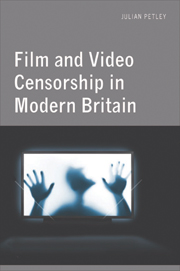Book contents
- Frontmatter
- Contents
- Acknowledgements
- Dedication
- Introduction
- Part I Censorious Rigmarole and Legalistic Overkill
- Part II After the Deluge
- 4 ‘The Tenor of the Times’: An Interview With James Ferman
- 5 ‘Reading Society Aright’: Five Years after the Video Recordings Act
- 6 The Video Image
- Part III Nineties Nightmares
- Part IV New Millennium, New Beginning?
- Appendix: The DPP List of ‘Video Nasties’
- Bibliography
- Index
4 - ‘The Tenor of the Times’: An Interview With James Ferman
from Part II - After the Deluge
Published online by Cambridge University Press: 05 August 2013
- Frontmatter
- Contents
- Acknowledgements
- Dedication
- Introduction
- Part I Censorious Rigmarole and Legalistic Overkill
- Part II After the Deluge
- 4 ‘The Tenor of the Times’: An Interview With James Ferman
- 5 ‘Reading Society Aright’: Five Years after the Video Recordings Act
- 6 The Video Image
- Part III Nineties Nightmares
- Part IV New Millennium, New Beginning?
- Appendix: The DPP List of ‘Video Nasties’
- Bibliography
- Index
Summary
Anyone who has read John Trevelyan's What the Censor Saw will realise what a close relationship Trevelyan enjoyed with many British film-makers, frequently advising them on censorship matters before and even during production. It's also noticeable that British films are rarely cut by the BBFC. Does this mean that current BBFC Director Ferman carries on in the Trevelyan tradition? Or have British film-makers simply internalised the Board's standards and know what they can and can't get away with? Ferman explains:
We are asked for advice sometimes prior to production, but we don't offer ourselves where we're not invited. However, films are very expensive to make, and if film-makers can know in good time the framework within which the society expects them to operate it can save them a lot of money later. We owe that service to the industry – if they want it. We are sent around two dozen scripts a year, and we make suggestions. Very often the makers will tell us the classification that they want and then we will tell them of any problem areas – things to look at and adjust rather than cut. But we'll also tell them, if necessary, that in our opinion they just can't get that classification without destroying the script entirely.
- Type
- Chapter
- Information
- Film and Video Censorship in Modern Britain , pp. 55 - 62Publisher: Edinburgh University PressPrint publication year: 2011

